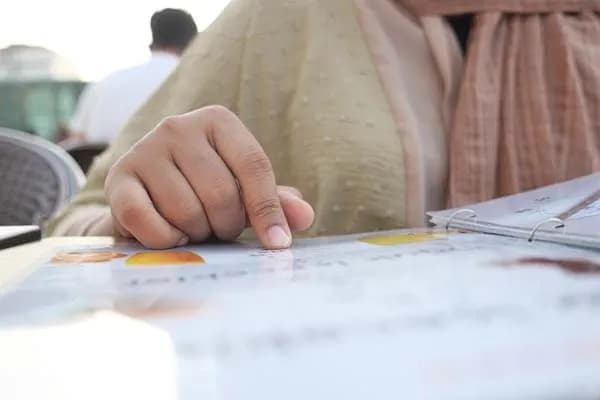Progress for 0 ad
Progress for 1 ad
Progress for 2 ad
Progress for 3 ad


Daniel Metaferiya
Addis Ababa, Ethiopia

For most people, dining out is a simple pleasure—choosing a restaurant, scanning the menu, and enjoying a meal in a lively atmosphere. However, this is not a straightforward experience for all patrons strolling to their nearby eateries. Visually impaired customers in Ethiopia often experience difficulties deciphering menus or must rely on external assistance to order a meal.
Meron Tesfay, an entrepreneur in her mid-20s, sought to tackle this very issue with a simple solution. The Addis Ababa University graduate who navigates her daily affairs while dealing with a debilitating nerve disease has begun designing braille-based menus for hotels and restaurants.
“I saw someone struggling to decide on paying for a meal because he could not read the menu,” she told Shega.
She recalls feeling sympathetic to the visually impaired customer as one of the motives for starting the business. An educational background that includes a master’s in special needs education and speech appears to have destined the young businesswoman for her new role. Growing up with a mother who worked as a cashier also afforded Meron direct exposure to the daily struggles of the visually impaired in Ethiopia’s service industry.
According to data from Orbis International, around 5.4 million people in Ethiopia are living with blindness or vision loss, with 1.63 million considered blind and 3.77 million having low vision; this translates to around 1.6% of the population being blind and 3.7% having impaired vision. The country also accounts for 30% of trachoma cases in sub-Saharan African countries, at around 1.2 million people.
While several high-profile hotels like Momona and Harmony have taken up Meron’s services, she still believes that the service sector has a long way to go before becoming accessible to all types of patrons. Getting the first round of hotels to buy the service entailed rejections from several brands in Addis Ababa’s service industry. With ten hotels now using Meron’s menus and a growing list of orders, a slight change in the tides is palpable.
Awash Bank’s Tatariwoch/Qaxaleewwan project, which looks to upscale and formalize MSME, recently backed Meron’s endeavors with a 300,000-birr award. Meron plans to buy a new printer with the funds, which cost around 400,000 birr, as the number of orders keeps rising.
Engraving the menus with braille marking requires a specific type of printer available at a few establishments in the capital.
“My usual customer’s printing house got recently demolished,” Meron says.
She hopes that the recent financial award will go a long way in helping her secure her own printer and create a steady, socially conscious business.
👏
😂
❤️
😲
😠

Daniel Metaferiya
Daniel Metaferiya is a writer, journalist and radio host, with a keen interest in technology. He follows developments in Ethiopia's startup ecosystem closely and is passionate about profiling unique MSMEs.
Your Email Address Will Not Be Published. Required Fields Are Marked *